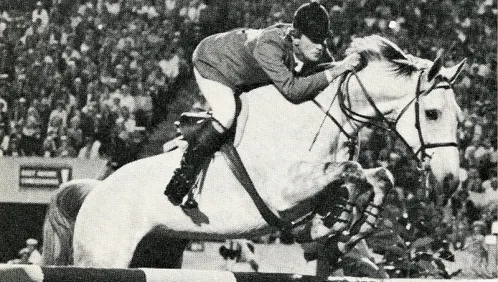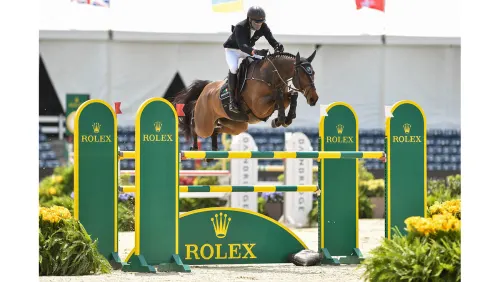Our columnist takes the reader behind the scenes of the USEF Hearing Committee, Hearing Panels and more.
The U.S. Equestrian Federation Planning Committee has been reviewing all parts of the organization over the past 18 months, including how members perceive the regulatory process.
Many aren’t familiar with the numerous components of the process until they receive a certified letter or want to file a protest or charge. As a member of the Hearing Committee and having served on Hearing Panels for the past few years, I hope to demystify this process.
While most people focus on hearings and what appears on the USEF website, these are just a part of the regulation department and its processes, which also include administrative penalties, charges, protests, all amateur/professional status changes and clarifications, warning cards, non-negotiable funds issues from competitions and the USEF as well as other investigations.
Prior to the presidency of David O’Connor, the Hearing Committee consisted of approximately 50 members from the various breeds and disciplines under the Federation umbrella. When hearings were noticed, anyone serving on the Committee could decide to attend and serve on the Hearing Panel. Under David’s leadership, Hearing Panels consisting on average of five people each were created from the approximately 30 Hearing Committee members.
This gives the charged party advance notice of who will be serving on their Hearing Panel and the chance to ask for recusal of conflicted parties in advance of the hearing. Likewise, while the Hearing Panel members do not know the parties or the cases prior to the hearings, they are required to identify any conflicts of interest at the start of any proceeding. Every member of every panel on which I have served takes this responsibility very seriously, and I have never felt that anyone has failed to adhere to this requirement.
Universal Horse Sense
From time to time, I hear members complain that they should be heard by a jury of their peers. For hunter/jumpers, this means that every panel member should be a hunter/jumper person.
Until a member goes through the process, it’s easy to assume that only a hunter/jumper person would know about the sport’s specific issues. What’s really most important is that the person is a horseman, knows the rules, has a clear conscience, listens and asks questions pertinent to the case, takes part in deliberations using logic and experience, and adheres to the conflict of interest and confidentiality requirements.
ADVERTISEMENT
It’s always better to recuse yourself if there is any potential for a respondent or charging party to claim conflict of interest, and I did so recently. A few months after the hearing, I saw one of the parties, and this person told me that he was worried there wasn’t a hunter/jumper person on the panel for his case.
But after going through the process, he understood that it wasn’t necessary. The people serving on these panels have many years of experience in our sports, and while they may come from different breeds and disciplines, the universal horseman’s knowledge, experience and common sense prevails.
Be Patient With The Process
Regulation takes time, and we’re all impatient with the process. That said, it’s much more efficient than in the past, and there’s not a backload of cases waiting to be heard.
Why does it take so long for a hearing to take place? Hearing dates are set a year in advance, and a case may not be ready when hearing dates are scheduled. Hearings require notice to the parties charged and time for response, evidence collection and scheduling, and some people retain counsel, which means that continuances may be requested because of conflicts with the hearing dates. If the case involved drug testing, there’s time involved from the collection of the sample to the testing, retesting if necessary, and reporting.
Since the introduction of administrative penalties, the number of hearings has significantly decreased. Using the precedent of prior cases, the Federation may offer respondents an administrative penalty, which they can accept or decline.
Administrative penalties typically consist of censure, fine, suspension, return of winnings or loss of amateur status, and they must be approved by the Hearing Committee co-chairs prior to being offered. If a person declines an administrative penalty, the case moves to a hearing, and that process begins. An administrative penalty is typically not offered for offenses for which there’s no penalty precedent.
Administrative penalties have made the regulatory process much more efficient and timely, since prior to this option, all these cases went through the hearing process.
Responsibility To Report
ADVERTISEMENT
Protests and charges between members, competitions and members, and the USEF and members go through some of the same procedures in the regulatory pro-cess. When the Federation brings a charge, the organization does the investigating and discovery process. When a member brings a charge or protest against another member or competition, the USEF assists the parties with any question they may have regarding the regulatory process but does not do any investigating.
Regardless of the road a charge or protest takes, all parties receive the information supplied by the other parties. Full disclosure is essential to maintaining the fair and level playing field.
Regulation is a partnership between the USEF and its members. The USEF can’t have a police force at every competition to ensure that the rules are enforced. Yes, there are stewards and technical delegates who are supposed to report cases of rule violations. Those who take the requirements of their position seriously will report any rule violations if they haven’t been able to achieve a solution between the parties involved at a competition.
Members propose the rules, and we all have a responsibility to report when they are not followed. But reporting a violation can be a daunting proposition, as many members believe that there will be recrimination for their actions.
Fortunately, this is more of an urban legend than a reality, but it’s grown to the point that it has stifled the members’ willingness to stand up when they witness a rule violation. This is human nature and difficult to overcome. If you do report a violation, the Federation staff will assist you in figuring out whether a protest or charge is appropriate or if the violation is something the Federation can process through the Alleged Rule Violation process when a protest is not the best route.
I hope this information helps readers understand how the regulatory process works and the role of the Federation and its members in regulating our sport.
Bill Moroney, Keedysville, Md., is president of the U.S. Hunter Jumper Association, a member of the U.S. Equestrian Federation Board of Directors, the USEF Hearing Committee and a USEF R-rated judge. He started writing Between Rounds columns in 2004.
If you enjoyed this article and would like to read more like it, consider subscribing. “USEF Regulation Proceedures Uncovered” ran in the October 17, 2011, issue. Check out the table of contents to see what great stories are in the magazine this week.















